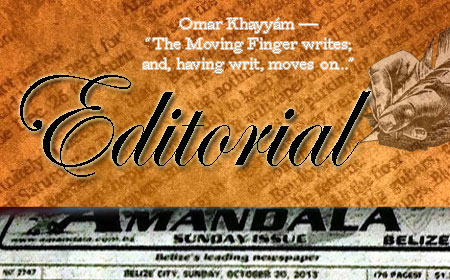Every year at budget time in March, Belize’s economic reality is exposed in that we import a lot more than we export. We are in a permanent deficit situation. We spend money we don’t earn. Belize has been living above its means for decades.
When they read their budget speeches, our Prime Ministers, who are also our Ministers of Finance, explain to us that they make up the shortfalls in Belize’s revenue through various loans and grants. The budgets are debated, and then they are passed. Life goes on.
We have seen that in the two most critical areas of our socio-economy, which are education and health care, our society is not doing very well. In fact, for the majority of our citizens, education and health care may be considered desperate aspects of life. Most Belizeans are not able to educate their children well enough to prepare them for gainful employment, while any sickness and old age inevitabilities constitute financial emergencies for the majority of Belizean families.
It seems that things are about to become significantly worse in Belize, socio-economically speaking. The Prime Minister, Rt. Hon. Dean Barrow, last week described the recent arbitration judgment with respect to the nationalization of Belize Telemedia Limited (BTL) as a victory for Belize, but most Belizeans see the figures as a major triumph for Lord Michael Ashcroft. In addition, there are certain financial judgments to be read in the near future which will likely cost Belize a lot more money, many of these financial judgments involving lawsuits of one sort and another brought by the aforementioned Lord Ashcroft.
There is a historical irony in what has happened to Belize since Lord Ashcroft came here in 1985. The leading figure in British Honduras where agitation for self-rule after World War II was concerned, was a mahogany/chicle contractor and businessman by the name of Robert Sydney Turton. Turton had risen from abject poverty in the streets of the colony to become a millionaire, and he did not like Englishmen. His English army officer father had abandoned his Belize Creole mother when he was a child. It was Bob Turton who pushed his personal secretary, George Cadle Price, into party politics in the middle 1940s.
The militant struggle of the People’s United Party (PUP) for self-government and independence had an anti-English flavor from the beginning of the PUP in 1950. But there was also a class of Belizeans who admired the British and bowed to them. They formed the National Party (NP) in 1951 to fight against the PUP.
The Belizean masses voted for the PUP in national election after national election until Belize achieved self-government in 1964 and, finally, political independence in 1981. With independence achieved at last, the Belizean people finally turned to the Opposition party – the United Democratic Party (UDP), which had succeeded the NP and the National Independence Party (NIP), the NIP having replaced the NP in 1958.
Lord Ashcroft, having become a multimillionaire in Britain, was invited to Belize in 1985 by a Belizean classmate of his from the late 1950s. The rest is a history which we can now describe as frightening. It is as if a kind of colonialism has returned to Belize: all we Belizeans will now do for the foreseeable future is work to pay Lord Michael. There will be suffering in this land.
The Belizeans who led us into this catastrophe are the politicians and attorneys of the PUP and the UDP. There are Belizeans in both the PUP and the UDP who became multimillionaires playing games with Lord Michael.
The two major political parties are the mechanisms through which we operate our parliamentary democracy. Belize’s democracy may be described as a relatively impressive one, in that we have free and fair elections on a regular schedule, without any political violence.
But Belize’s economy is in desperate shape. And, Belize’s sociology has been marked in the post-independence era by the emergence of a very wealthy elite, and the steady increase of crushing poverty.
The post-independence generation of Belizeans, who are also the post-television generation of Belizeans, have not produced any organized political force to challenge the UDP. What the post-independence, post-television generations of Belizeans have produced is a murderous civil war in the old capital/population center. Belize is in socio-economic crisis, and that crisis is about to get worse.
Power to the people. Remember Danny Conorquie.

